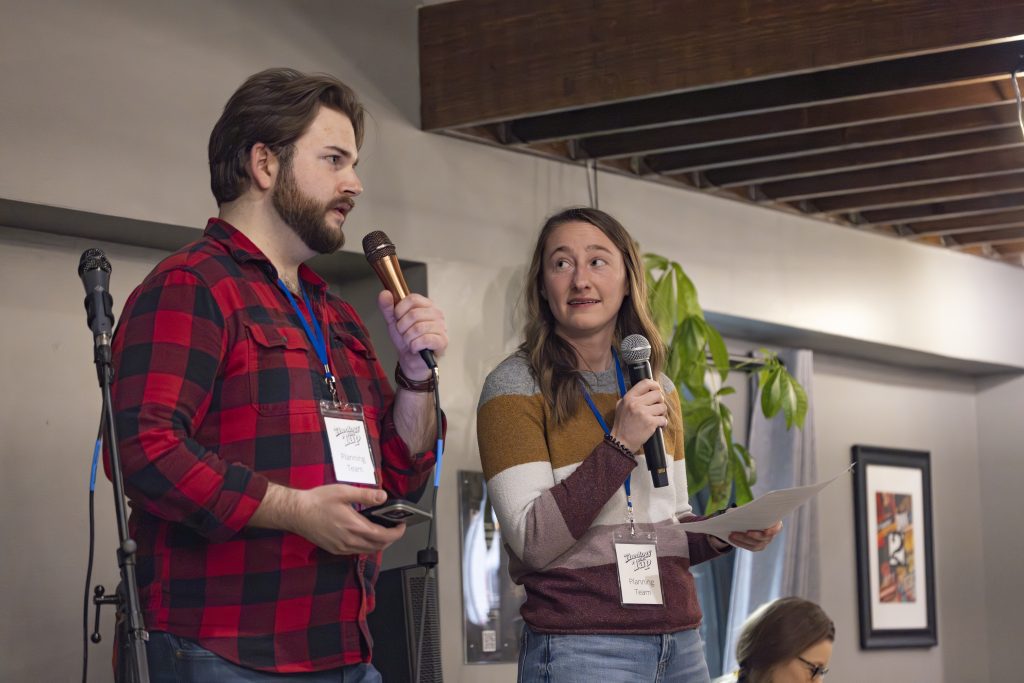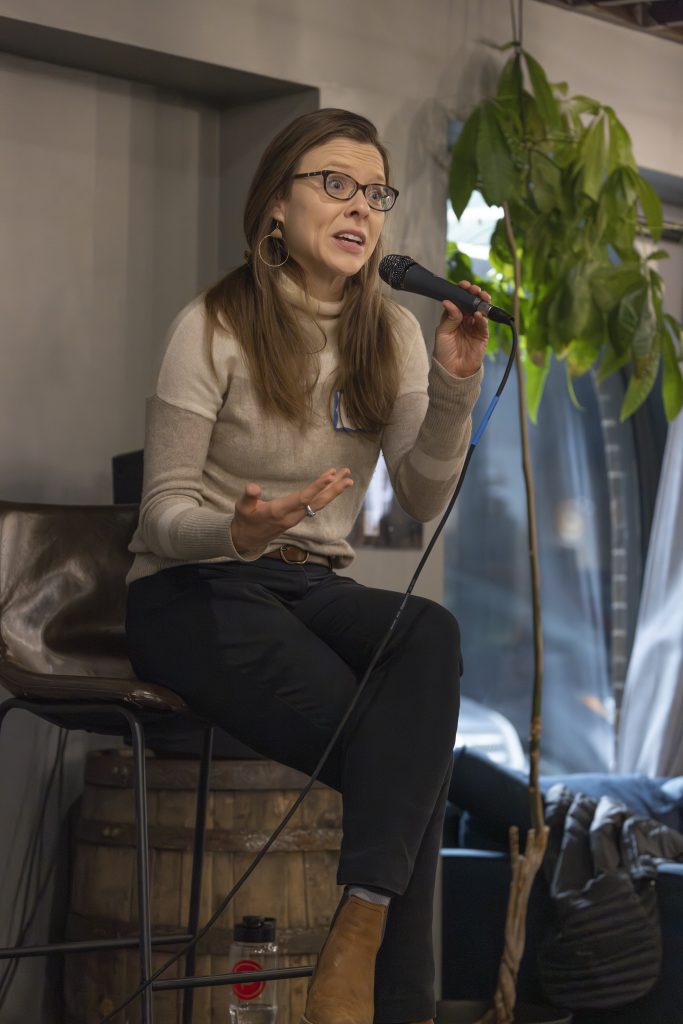January 23, 2024 // Diocese
Young Adults Learn How to Cope with Mental Health Struggles
Young adults gathered at 2Toms Brewing Company in Fort Wayne on Tuesday, January 16, for the opening session of the 2024 Theology on Tap winter series to hear from Beth Hlabse about mental health, suffering, and healing. During the evening, they shared food and drinks while engaging in discussions about the keynote talk.
Hlabse, a mental health counselor and the Program Director for the Fiat Program on Faith and Mental Health at the McGrath Institute for Church Life at the University of Notre Dame, talked about the detrimental effects of isolation, citing a figure that showed an increase in isolation in young adults throughout the past four decades, when, previously, isolation was considered more of an issue for those older than 65.

Photos by Joshua Schipper
Theology on Tap emcees Isaac Melton and Cadence Faurote introduced the series patron, St. Edith Stein, who persevered despite suffering. Stein converted to Catholicism from Judaism, became a Carmelite nun, and “brought the light of Christ to a concentration camp,” Faurote said during the session at 2Toms Brewing in Fort Wayne on Tuesday, January 16.
“These are trends that are concerning, because loneliness presents a real risk factor,” Hlabse said. “It can exacerbate the challenges we experience in life. It can exacerbate our vulnerability to mental illness. But it demonstrates, on the other side of that, that we need connection, because what we’ve learned is the mind is embodied, embedded, and relational.”
Pulling from the field of neuroscience, she also talked about the dynamic aspect of the mind, saying that the mind is composed of different networks of memory, and that these networks change through life.
“And this is beautiful, because it actually shows the neurobiological underpinnings for the capacity to heal. It may not necessarily mean that one’s diagnosis, if we have a mental health diagnosis … goes away, but it does mean that the way I experience those symptoms, and the way I manage those symptoms, can change, such that I can feel more free, more able to live a meaningful connected life even in the midst of illness.”

Beth Hlabse, a mental health counselor, shared advice on navigating suffering and healing through both faith and science.
This led Hlabse to begin answering the question, “Why do I suffer?”
“Science says, ‘Well, it’s a combination of factors, right? It’s genetic, it’s due to our biology, due to our environment, due to our development.’ Mental illness is never reducible to any one of these factors. It comes about through a combination of these factors because of the fact that, as people, our mind is embodied, embedded, relational, and dynamic. That’s to say, we’re really vulnerable to our environments. But it also points to the fact that elements of our environment can really help us to experience greater wholeness and greater health.”
Bringing faith into the equation, she said we know “through the eyes of faith that, as people, we are created good, we are created in God’s image and in God’s likeness. And I always like to pause and kind of think, ‘Well, what does that mean to be created in God’s image and likeness?’”
She compared the relationship of the Trinity to individuals, saying that, like the Trinity, people cannot live in isolation; people were made for love.
Next, Hlabse talked about healing from suffering. She explained that the apostle Thomas was wounded by the death of Christ, and that the grief of this wound contributed to his doubtfulness in Jesus’ resurrection.
“When all of Thomas’s friends were gathered in the Upper Room when those other apostles were gathered, and Christ appeared to them, Thomas wasn’t there. I wonder what might have gone through Thomas’ mind when he heard from his friends that Christ had appeared and he wasn’t there. ‘What’s wrong with me? Perhaps this guy isn’t who he says he is? Why not me? Perhaps I’m cut off or inaccessible from the promises offered to everybody else?’ I can imagine it being a pretty dark space.”

Jay Annable engages in a small-group discussion about mental health before a question-and-answer session.
She said that, by appearing to Thomas at the place of Thomas’ wounding, Christ reached into his wounds to heal him just as Thomas touched Jesus’ wounds.
“He was offering Thomas communion and the possibility for new life, entering into his wounds, demonstrating to him that he wasn’t actually alone in that space. And for Thomas, this was really the birth of his ministry, going forth in the light of the resurrected Christ.”
Touching on scientific ways to heal wounds, Hlabse said to identify unmet needs. Having unmet needs, she explained, decreases one’s ability to deal with stressors. Breaking these needs into four categories, she said to find supportive relationships, spend time in beauty and nature, move around, and find a silent place to relax.
“Anytime in silence can be an opportunity for a movement toward communion, just recognizing God’s presence with us, an experience of prayer, recognizing our situatedness and creation,” Hlabse said.
After her talk, Hlabse fielded questions from the young adults who had been engaged in small-group discussions.
Theology on Tap in Fort Wayne continues through Tuesday, February 13. For more information, visit
diocesefwsb.org/tot-fw.
The best news. Delivered to your inbox.
Subscribe to our mailing list today.






